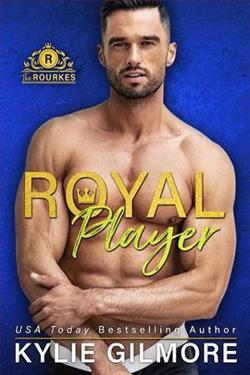Page 29 of Shattered Ice
The dining sequence begins with a synchronized clatter of utensils. Silver flashes like weapons. I track my father’s signals: the way he tilts a glass to indicate a new topic or slices the air with his hand to end a conversation that displeases him. It’s a game I’ve been forced to master, where the rules change but the outcome—my submission—is always the same.
I listen as the table dissects the university’s expansion plans, the athletic department’s new media deal, and the finer points of a tax-dodging strategy no one would ever admit to outside these walls. I’m supposed to provide color commentary, but my mind is elsewhere. I’m thinking about Clara Harrington—the way she met my stare without blinking, the way she cuts cleaner with words than I do with blades, the way she doesn’t just survive Briarcliff but forces it to shift around her. Her name isn’t spoken here. Her presence in my life is an irritant, a variable my father’s regime is designed to eliminate. And yet, she’s become an essential part of my cognitive landscape. I can’t banish her, not even here.
“Adrian, your thoughts?”
Snapped back to the table. “I think the university’s legacy program is at risk of becoming a caricature,” I say, reciting a line I rehearsed earlier. “We keep emphasizing tradition, but thenarrative outside these walls paints us as out-of-touch. We need to invest in something that looks forward, not just backward.”
There’s a brief silence. My father’s eyebrow moves by a millimeter, the only sign of surprise. The president nods, pleased. “I agree, Charles. The younger generation wants to see innovation. Maybe Adrian should join our next vision committee.”
Charles smiles, his teeth as even and white as the buttons on his cuff. “He will. He has an aptitude for managing risk.”
The conversation rolls on, but I’m left with the aftertaste of my father’s approval, which, like the amuse-bouche, is exquisitely crafted, gone in a second, and leaves a metallic bitterness on the tongue. I fiddle with my water glass and wonder what it would be like not to be watched. My father glances at me from time to time, never long enough to be staring, but always long enough to remind me I’m still under review. The scrutiny is more intense than anything I face on the ice, where at least I can hit something if it gets too close.
After the soup course, Charles leans in. “You’ll be in attendance at the winter gala,” he says, his voice low and private. “Mark Ellison from Toronto wants to discuss your future. Make yourself available. And speaking of your future, midterms are next week. I saw your compliance report. It’s pathetic. This tutor of yours better be earning her keep.”
Her keep.My hand clenches around my fork under the table, the tines digging into my palm. I’d gut anyone who used that word for her. The threat stank in the air: her scholarship knotted to mine, a second chain, a leash disguised as generosity.
I nod. “Yes, sir.”
My father’s gaze lingers. “Don’t embarrass us.” It’s not a warning; it’s a fact.
The meal marches on, each course another reminder that I’m a cog in a machine. I play my role, smile at the correct jokes,nod at the correct projections. But all the while, my mind recites the facts of Clara’s world—the tight, efficient way she moves, the way her hands turn chaos into order, the tiny acts of defiance she deploys against the entropy of the universe.
I realize, mid-salad, that I’m jealous of her. Not just of her intelligence or her ability to endure Briarcliff’s social gauntlet, but of the fact that she seems capable of choosing who she is, even when the world tallies her failures. I’ve been measured since birth and found wanting in ways that can never be corrected. Every win is his trophy; every mistake, my crime scene.
The cheese course clings like grease. Somewhere down the table, a donor whispers, “Shame if Hale’s heir can’t read his own contracts.” The words weren’t meant to carry, but they did. A hot spike of shame drives straight through my gut.
There’s a moment, between the cheese plate and dessert, when my father excuses himself to take a call. The table relaxes. The conversation loosens. I watch as the Provost glances at her phone, then at me.
“You know,” she says, “you don’t have to do this forever.”
I meet her gaze, surprised by the kindness in it. “Do what?”
She smiles, a thin line. “Be the next Charles Hale. Unless youwantto.”
Her voice slides under my skin like contraband. I don’t answer. I don’t know how.
When my father returns, the atmosphere snaps back into place. The evening concludes with a toast.
“To the next generation,” Charles intones, raising his glass. “May they find the world ready for them, and themselves ready for the world.”
Crystal rings, brittle and clean, like bones snapping. I raise my glass, drink, and wonder if anyone else tastes the bitterness that hits the back of my throat.
I excuse myself at the earliest plausible moment and escape to the library, the only room in the house where the shadows don’t judge me. The air smells of old leather, blood, and dust. I stand in the doorway for a long moment, breathing it in, my hand drifting to a shelf, fingers trailing over spines of books I’ll never be allowed to read for pleasure.
What would Clara think of this place?Would she find solace in these walls like I do? Or would the silence only amplify the darkness? The thought settles uneasily in my chest. I can see her here, wandering the aisles, her fingers brushing over the covers. Too alive for these mausoleum walls. Her laughter would ricochet off these shelves—too loud, too real, and exactly what I’d ruin if I brought her here.
She’s the only fracture in the dark, and it makes me want to break her open.
My hand goes to my pocket, my thumb hovering over the phone. The urge to text her is a physical ache, a stupid, reckless impulse.Where are you? What are you doing? Are you thinking of me?I type out a single word—Clara—and stare at it, the five letters a confession on the bright screen. The glow paints my hands like I’m already caught.
I leave her name on the screen, unsent.
Mine alone to see.
Chapter 17
Clara















